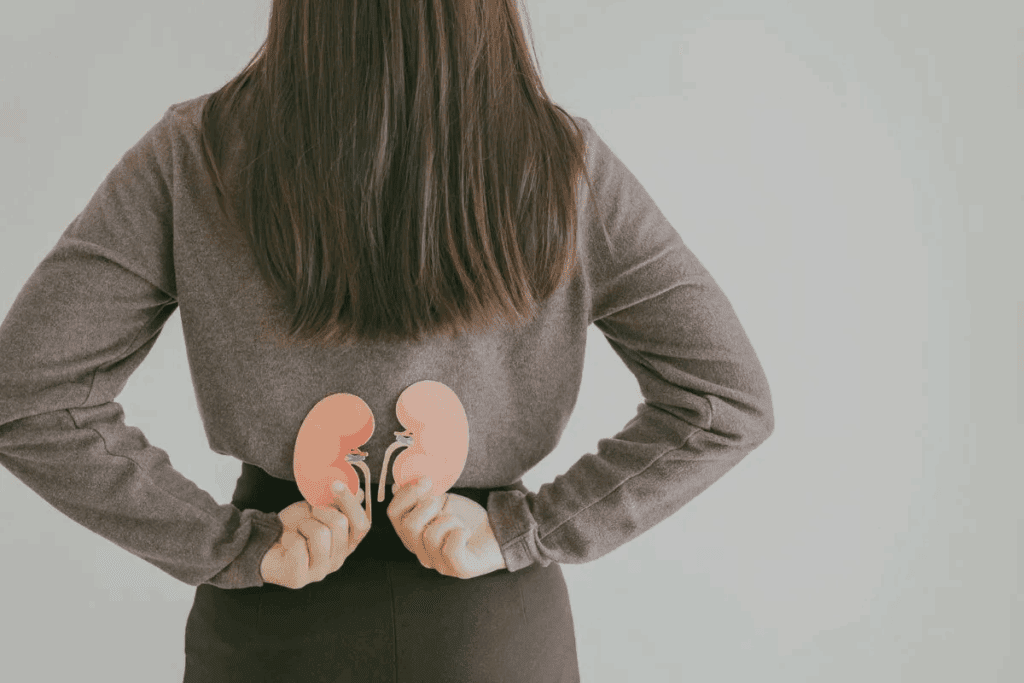
More people are looking for natural ways to treat kidney stones. At Liv Hospital, we know how painful kidney stones can be. We’re here to share proven ways to help.
Apple cider vinegar is getting a lot of attention. Studies show it might help with kidney stones. It can make urine more alkaline and boost citrate levels. This could stop stones from forming.
We’re diving into how apple cider vinegar could help with kidney stones. We’ll look at the science behind it. Our aim is to help you understand its benefits.
Discover cider vinegar for kidney stones with 6 key facts and science-backed insights.
Key Takeaways
- Apple cider vinegar may help dissolve kidney stones and improve urinary pH.
- Increasing citrate levels through apple cider vinegar consumption can help prevent stone formation.
- Scientific research supports the benefits of apple cider vinegar in managing kidney stones.
- Liv Hospital provides patient-centered care and evidence-based information on complementary therapies for kidney stones.
- A well-rounded approach to treating kidney stones might include natural remedies like apple cider vinegar.
The Growing Problem of Kidney Stones

Kidney stones are becoming more common worldwide. They affect millions, causing pain and health problems.
Common Types and Their Composition
Kidney stones vary in type and composition. The most common include:
- Calcium Oxalate Stones: These are the most common, caused by too much oxalate in the urine.
- Uric Acid Stones: These form when there’s too much uric acid in the urine, often linked to diet or metabolic issues.
- Struvite Stones: These are linked to urinary tract infections (UTIs) and can grow fast.
- Cystine Stones: These are rare and happen in people with a genetic disorder that causes cystine to leak into the urine.
Risk Factors and Prevalence
Several factors can increase your risk of getting kidney stones. These include:
- Dehydration: Not drinking enough water can lead to stone formation.
- Diet: Eating too much sodium, animal protein, and foods high in oxalate can raise your risk.
- Genetic Predisposition: If your family has a history of kidney stones, you’re more likely to get them.
- Medical Conditions: Certain conditions like hyperparathyroidism, gout, and UTIs can also increase your risk.
Kidney stones are becoming more common. This is due to diet and genetics in some groups.
Conventional Treatment Approaches
Treatment for kidney stones depends on several factors. These include the stone’s size, type, and cause, as well as your overall health. Common treatments are:
- Pain Management: Medications to help manage pain while the stone passes.
- Hydration: Drinking lots of water to help pass the stone.
- Medical Expulsion Therapy: Medications to help the stone pass more quickly.
- Surgical Interventions: Procedures like lithotripsy or surgery for larger stones.
Knowing about these treatments is important. It helps understand the benefits of alternative remedies like apple cider vinegar.
The Science Behind Cider Vinegar for Kidney Stones

Apple cider vinegar’s use for kidney stones is based on its chemical makeup and long history. It mainly contains acetic acid. This acid is thought to help manage kidney stones.
Acetic Acid: The Active Component
Acetic acid makes apple cider vinegar taste and smell unique. Studies show it might help control urine pH and boost citrate levels. Both are important in preventing kidney stones.
Key Properties of Acetic Acid:
- Antimicrobial properties
- pH modulation
- Citrate level increase
pH Modulation Effects on Kidney Stone Formation
The pH of urine affects kidney stone formation. An alkaline pH can increase the risk of some stones. But an acidic pH might lower the risk of others. Acetic acid in apple cider vinegar could help adjust urine pH, possibly reducing stone formation.
| Urine pH Level | Effect on Kidney Stones |
| Alkaline (pH > 7) | Increased risk of calcium phosphate stones |
| Acidic (pH | Potential reduction in uric acid stones |
| Neutral (pH = 7) | Optimal for preventing certain stone types |
Historical Use as a Folk Remedy
Apple cider vinegar has been used for centuries to treat kidney stones and other ailments. Its long history of use is well-documented. But, the scientific proof of its effectiveness is growing.
Historical records show ancient cultures used vinegar for health benefits, including urinary issues.
Understanding apple cider vinegar’s history and science helps us see its possible role in treating kidney stones.
Fact #1: How ACV May Break Down and Soften Stones
Kidney stones are a big problem for millions of people. They cause a lot of pain and can lead to serious health issues if not treated right. Apple cider vinegar might help soften or break down these stones.
Apple cider vinegar has been used for a long time. It has acetic acid in it, which might help dissolve or soften kidney stones.
Mechanism of Action on Stone Structure
ACV might change the structure of kidney stones. Studies say that acetic acid could make some stones softer. This makes them easier to pass or smaller.
The acid might also change the pH of urine. This makes it harder for stones to form and could help break down existing ones.
Research on Dissolution Potentials
Many studies have looked into ACV’s effect on kidney stones. But most of this research was done in labs or on animals. It shows ACV might help with certain types of stones, like calcium oxalate.
But, we need more human studies. We also need to know how much ACV to use and for how long.
Limitations of Current Evidence
The research we have is promising but has big limits. Most studies were done in labs or on animals. There aren’t many human trials.
We also don’t know the best way to use ACV for kidney stones. More research is needed to figure this out.
Fact #2: Reducing Calcium Oxalate Stone Recurrence
Many people worry about getting calcium oxalate stones again. Recent studies show Apple Cider Vinegar might help naturally. These stones are common and can be hard to stop from coming back.
Research on Apple Cider Vinegar shows it could help with stone recurrence. It focuses on how ACV affects urinary citrate levels. Citrate helps stop stones from forming, so more of it in the urine is good.
Impact on Urinary Citrate Levels
Drinking Apple Cider Vinegar can increase urinary citrate levels. This is important because citrate binds to calcium. This means less free calcium to form stones, lowering the risk of new stones.
A study in a medical journal found ACV increases urinary citrate. This is good news for those at risk of getting stones again.
Effects on Calcium Excretion
Apple Cider Vinegar also affects how much calcium is in the urine. Some studies say it can lower calcium excretion. This helps prevent stones from forming.
“The possible benefits of Apple Cider Vinegar on urinary citrate and calcium excretion make it a promising option for preventing calcium oxalate stones.”
A leading researcher in urology
Comparative Studies with Other Natural Remedies
It’s important to compare natural remedies for kidney stones. Apple Cider Vinegar is often compared to lemon juice, potassium citrate, and diet changes.
- ACV vs. Lemon Juice: Both can increase urinary citrate, but ACV’s acetic acid might have a longer-lasting effect.
- ACV vs. Potassium Citrate: Potassium citrate helps prevent calcium stones, but ACV is a natural option with fewer side effects.
More research is needed to fully understand the benefits of Apple Cider Vinegar. But it looks like a good natural way to prevent calcium oxalate stones from coming back.
In summary, Apple Cider Vinegar might help prevent calcium oxalate stones by affecting urinary citrate and calcium. Always talk to a healthcare provider before trying it as a preventive measure.
Fact #3: Kidney Cleansing Claims: Separating Fact from Fiction
Apple cider vinegar’s claim to cleanse the kidneys has caught a lot of attention. It’s important to know the difference between stories and proven facts. We need to look at both the popular tales and the scientific truth.
Anecdotal Reports of Detoxification
Many people say apple cider vinegar helped “detox” their kidneys. They mention better health and fewer kidney stone symptoms. Yet, these stories are not enough to replace solid scientific proof.
Some fans of ACV believe its acetic acid can break down mineral deposits and boost kidney work. But without solid clinical trials, these ideas are just guesses.
Scientific Perspective on Kidney Cleansing
The idea of “kidney cleansing” is debated in science. Kidneys filter blood waste and their work is controlled by the body. While natural aids might help kidneys, there’s no clear proof of “cleansing” them.
Studies on apple cider vinegar and kidneys are ongoing. Some research shows ACV might help kidney health markers. But, we need more studies to know for sure.
Potential Benefits for Overall Kidney Function
Even if “kidney cleansing” claims are too bold, apple cider vinegar might help kidneys. Some studies hint at ACV’s role in lowering kidney stone risk and improving function markers.
| Potential Benefits | Scientific Evidence |
| Reduced risk of kidney stone formation | Some studies suggest a positive effect |
| Improved kidney function markers | Limited but promising research |
| Detoxification claims | Lacking in scientific evidence |
In summary, apple cider vinegar might be good for kidney health, but we should be cautious about “kidney cleansing” claims. By knowing both the stories and the science, we can make smart choices about using ACV for health.
Fact #4: Pain Relief and Symptom Management
Kidney stone pain is very painful. While there are treatments, people are looking into ACV for relief. ACV might help manage pain and symptoms.
Anti-inflammatory Properties
ACV might help because it has anti-inflammatory properties. The acetic acid in ACV could be why. Reducing inflammation could make passing stones easier and less painful.
User Experiences with Discomfort Reduction
Some people say drinking ACV helps them feel better. These stories are not proven, but they hint at ACV’s benefits. User experiences vary, but ACV might help with pain.
Complementary Approach to Medical Pain Management
ACV could be used alongside medical treatments for pain. Always talk to a doctor before trying ACV for pain. They can help make sure it’s safe and part of a good plan.
Important things to think about with ACV for pain relief include:
- The possible anti-inflammatory effects of ACV
- Stories of people feeling less discomfort
- Always talking to a healthcare professional
Fact #5: Safety Profile and Common Misconceptions
It’s important to know if apple cider vinegar is safe for treating kidney stones. We’ll look into its safety, debunk myths, and talk about its side effects and safe use.
Can Apple Cider Vinegar Cause Kidney Stones?
Many worry if apple cider vinegar can lead to kidney stones. But, research shows it’s unlikely to cause them. It might even help prevent some types of stones by changing the pH and citrate levels in urine.
Citrate in ACV helps stop calcium oxalate stones, the most common type. Yet, everyone reacts differently. If you’ve had kidney stones before, talk to your doctor before trying ACV.
Potential Side Effects and Contraindications
Apple cider vinegar is mostly safe but can cause problems for some. Common issues include:
- Digestive discomfort
- Tooth erosion from its acidity
- Possible interactions with medicines like diuretics and insulin
People with gastroparesis or diabetes should be careful. ACV might not be right for everyone, like those with kidney disease or on certain meds.
Safe Consumption Guidelines
To use apple cider vinegar safely, follow these tips:
- Mix ACV with water (1-2 tablespoons in 8 oz water)
- Start with small amounts to see how you react
- Rinse your mouth with water after drinking to avoid tooth damage
- Talk to a doctor, if you have health issues or take meds
By following these guidelines and knowing the possible side effects, you can use apple cider vinegar wisely for your kidney health.
Fact #6: ACV Formulations: Liquid, Pills, and Gummies
Apple cider vinegar (ACV) comes in different forms like liquid, pills, and gummies. Each has its own benefits and things to consider. If you’re thinking about using ACV to prevent kidney stones, knowing the differences is key.
Comparing Efficacy Between Forms
The effectiveness of ACV can change based on how it’s made, how much you take, and how your body reacts. Liquid ACV is often seen as the most traditional and possibly the most effective. It usually has the ‘mother’ of vinegar, which is full of acetic acid and other good stuff.
Liquid ACV is easy to add to your day, like mixing it with water or using it in dressings. But, some people don’t like its taste.
ACV pills are a good choice if you can’t stand the taste of liquid ACV. But, how well they work can depend on what’s in them and how they’re made.
ACV gummies are great for those who can’t swallow pills. They taste better, but they might have sugar or flavorings. This could be a problem for people watching their sugar intake.
Dosage Considerations for Kidney Health
When using ACV for your kidneys, how much you take is very important. The right amount can change based on the type of ACV and your health.
- Liquid ACV: Start with 1-2 tablespoons (15-30 ml) mixed with water.
- ACV pills: Always follow what the maker says.
- ACV gummies: Also, follow the maker’s advice on how much to take.
Begin with a small amount and see how your body reacts. Then, adjust as needed, but always with a doctor’s help.
Quality Indicators When Selecting Products
When picking an ACV product, look for these signs of quality:
- Presence of the ‘mother’: For liquid ACV, having the ‘mother’ is a sign of good quality.
- Acetic acid content: Look for a product with about 5% acetic acid.
- Manufacturing standards: Choose products made by companies that follow good practices (GMPs).
- Third-party testing: Products tested by others can give you more confidence in their quality.
By thinking about these points, you can pick the best ACV for your kidney health.
Implementing Apple Cider Vinegar in a Comprehensive Kidney Stone Prevention Plan
Using apple cider vinegar is part of a bigger plan to prevent kidney stones. It’s not just about adding ACV to your diet. It’s also about following other healthy habits that can lower your risk of getting kidney stones.
Recommended Usage Methods and Recipes
To use apple cider vinegar right, you need to know how to take it. Mix one to two tablespoons of ACV with water is a good start. Some like to drink it before meals for extra benefits.
Another way is to mix ACV with honey and water. This makes the drink taste better and is easier to drink every day.
Complementary Dietary Approaches
Your diet is key in preventing kidney stones. Drinking lots of water is important. It helps dilute your urine and lowers the chance of minerals forming stones.
Eating a balanced diet low in sodium and animal protein is also good. Foods high in calcium, like dairy, can help too. They bind oxalate in your gut, which means less oxalate in your urine.
Importance of Medical Consultation
Even with diet changes and supplements like ACV, seeing a doctor is vital. This is true for anyone who’s had kidney stones before. Doctors can give advice tailored to your health and history.
Talking to your doctor about ACV and any other medications or health issues is also key. This makes sure adding ACV to your prevention plan is safe and works well.
By using apple cider vinegar with other prevention steps and with a doctor’s help, you can make a strong plan. This plan can help lower your risk of getting kidney stones.
Conclusion: The Promise and Limitations of Apple Cider Vinegar for Kidney Health
Apple cider vinegar (ACV) might help with kidney health, like preventing kidney stones. Studies show that acetic acid in ACV could change pH levels. This might help stop some types of kidney stones from forming.
But, we must remember ACV’s limits. It’s not a cure-all for kidney problems. People with kidney stones or diseases should talk to their doctor before trying ACV.
It’s best to use ACV with caution and under medical advice. This way, you can balance your diet and possibly use ACV to support your kidneys. Knowing ACV’s benefits and drawbacks helps you make smart choices for your health.
FAQ
Does apple cider vinegar help prevent kidney stones?
Apple cider vinegar might help prevent kidney stones. It does this by increasing citrate levels in urine and reducing calcium. This makes it a natural option for those at risk.
Can apple cider vinegar break down kidney stones?
Apple cider vinegar might break down kidney stones. Its acetic acid could dissolve certain stones. But, more research is needed to confirm this.
Is apple cider vinegar good for kidney health?
Apple cider vinegar could be good for kidney health. It has anti-inflammatory properties and supports kidney function. But, it should not replace medical treatment.
Can apple cider vinegar cause kidney stones?
Apple cider vinegar is unlikely to cause kidney stones. When taken in moderation, it might even help prevent them.
How should I consume apple cider vinegar for kidney health?
Dilute apple cider vinegar in water and drink it in moderation. It should be part of a balanced diet and under a healthcare professional’s guidance.
What is the best form of apple cider vinegar for kidney stones?
Liquid apple cider vinegar is best for kidney health. It has the ‘mother’ of the vinegar, which is full of acetic acid and other good stuff.
Are there any side effects of using apple cider vinegar for kidney stones?
While generally safe, too much apple cider vinegar can cause problems. It might upset your stomach or erode your teeth. So, always use it in moderation.
Can I use apple cider vinegar with other natural remedies for kidney stones?
You can use apple cider vinegar with other natural remedies. But, always check with a healthcare professional first. They can help ensure it’s safe and effective.
How does apple cider vinegar compare to other natural remedies for kidney stone prevention?
Apple cider vinegar has its own benefits for preventing kidney stones. It’s compared to citrate supplements and dietary changes. A complete prevention plan is key.
Is it necessary to consult a doctor before using apple cider vinegar for kidney stones?
Definitely consult a healthcare professional before using apple cider vinegar for kidney stones. This is even more important if you have other health issues or are looking for an alternative to medical treatment.
References
Reimer, R. P., Engels, R., & Huizinga, W. (2021). Manual kidney stone size measurements in computed tomography: How accurate are they? Scientific Reports, 11, Article 15881. https://www.nature.com/articles/s41598-021-95962-z




































